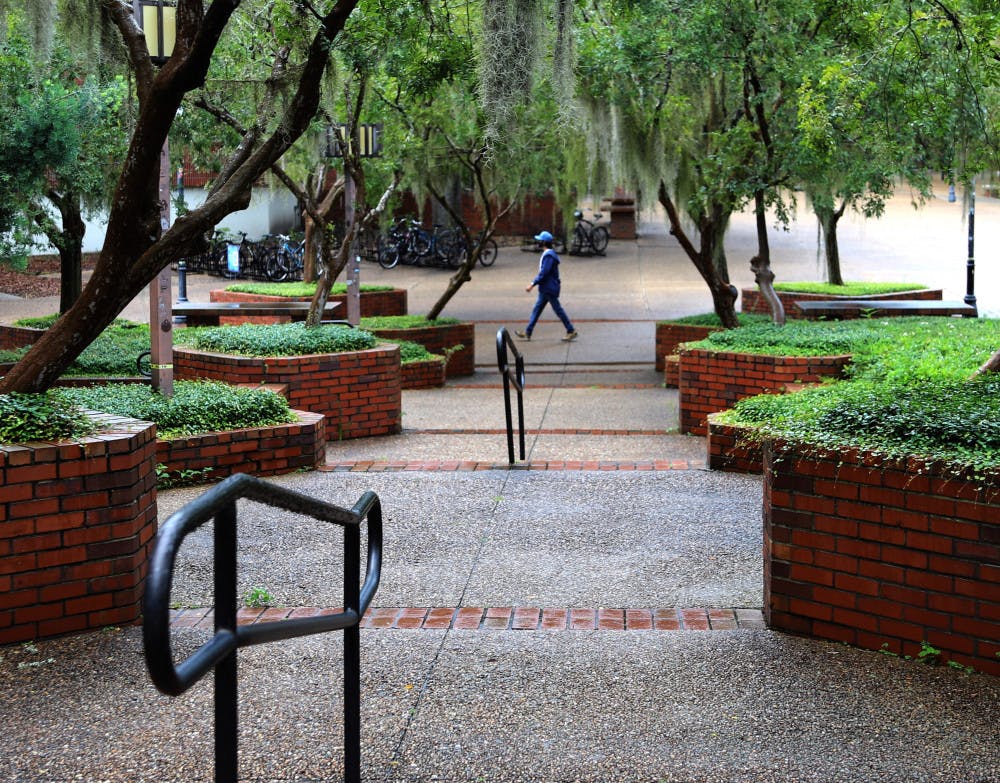While the number of UF admits keeps growing, Black, Hispanic and Native American admits saw subtle decreases this year.
Like last year, more than half of the class of 2025 admits were women, and 41% were men. Asian admits increased this year by more than 100 admits while white admits made up about half of all admits, UF spokesperson Cynthia Roldán wrote in an email.
“Diversity is really important to the university,” said Charles Murphy, UF’s director of freshman and international admissions. “Especially in the pandemic because I think whether you look at almost any aspect of the impact of the pandemic, it’s hurt underrepresented groups more acutely.”
Hispanic admits made up about 18% of admits, Black admits made up about 5% and Native Americans made up under 1%. There were 101 less Hispanic admits and 47 less Black admits this year. About 20% of applicants chose to not identify their race.
One reason why the number of Asian people admitted to UF has slightly increased is because the Asian population is growing around the country and the state, said Murphy. The Hispanic population is also increasing in Florida; however, the number of Hispanic admits to UF dropped slightly this year, Murphy said.
The drop in Hispanic and Black students may be due to how COVID-19 has disproportionately impacted those communities, he said.
Black, Hispanic and Native American populations were four and a half to five and a half times more likely to get hospitalized because of COVID-19, according to Centers for Disease Control data. The populations are more susceptible to risks because they disproportionately make up a big portion of low-income communities.
The disproportionate impact on Black, Hispanic and Native American students has led to a fall in financial aid applications at UF and nation-wide this year, Murphy said.
In terms of efforts to increase diversity on campus, UF is looking to hire a new chief diversity officer. The search has been narrowed down to four people, said Audrey Gainey, Director of talent acquisition and onboarding at UF’s HR Department, during a search committee meeting April 15. The four finalists are Marquita Booker, Kauline Cipriani, Lakesha Butler and Seval Yildirim.
UF’s office of student financial aid and scholarships has also been reaching out to low-income students to help them with any questions they may have about how to pay for school.
UF’s in-state admits totalled 5,192 this year compared to 5,835 last year. While there are still 4,571 admits still need to prove their Florida residency, most of those applicants are expected to be labeled as in-state admits Roldán wrote.
The number of out-of-state and international admits both increased this year. Non-Florida admits totalled 4,757 compared to 4,594 last year, Roldán wrote. Meanwhile, the number of international admits nearly doubled this year, she wrote.
The rise of out-of-state students came even as UF stuck with its standardized testing requirements while other schools dropped it due to the pandemic.
Some students did face difficulty taking tests in states like California, Murphy said. Some students applied but weren’t able to submit test scores, so they weren’t admitted. Others did not apply at all due to their inability to take tests.
The COVID-19 pandemic was likely a factor in the rise of international students, Murphy said. Because of uncertainty around the pandemic last year, international students weren't sure if they’d be able to get to UF easily. Now that vaccines are available and in-person classes will return in Summer, UF received more international students interested in enrolling, Murphy said.
Many students labeled as international students live in the U.S., Murphy said. They’re labeled as international either because they don’t have permanent residency or they’re attending boarding school in the U.S.
If COVID-19 is more present on campus than expected by the upcoming Fall semester, UF has plans in place if admits abroad can’t travel to the U.S., but the plans have not yet been solidified, Murphy said. UF would work with international students on a case-by-case basis to either have them take online classes or suggest skipping a semester.
While Hispanics and Asians have been growing in size at UF, the number of Black undergraduates overall has been dropping for several years. As UF looks for a new chief diversity officer, admission demographics seem to remain stagnant.
Contact Alexander Lugo at alugo@alligator.org. Follow him on Twitter @AlexLugo67.

Alex is a fourth-year journalism student at UF and is in his third semester at The Alligator where he is serving as the university editor. He previously reported on university administration and the city and county commission. In his free time, he enjoys video games, traveling and being outdoors.






